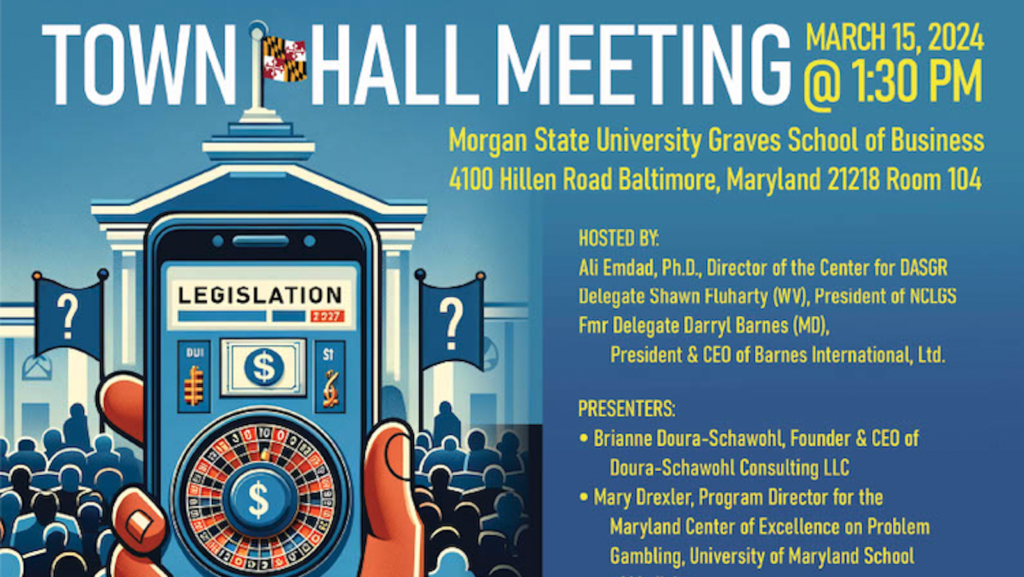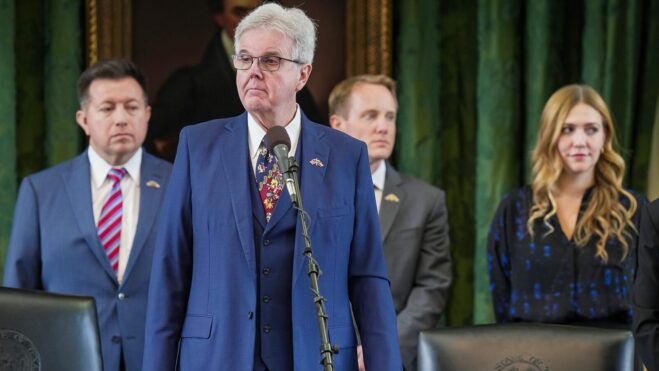As Maryland Online Casino Efforts Stall Out, Door Is Wide Open For More Debate, More Research
A town hall meeting produced healthy debate over societal and economic impacts of online casino — debates that are far from resolved.
6 min

Maryland’s legislative session comes to an end Monday, and, barring some shocking last-second plot twist, the state will not be legalizing online casino gaming this year. Revenue from the activity was not included as a funding source in the budget agreement state legislators reached last Wednesday, so, for 2024, it would appear that’s that.
But maybe that’s not a bad thing — even for iCasino advocates. At the very least, the state still has a lot to discuss, debate, and research when it comes to mobile casinos, and there’s upside to having more time to get more people on the same page.
This was evident on March 15, when the Graves School of Business at Morgan State University played host to a town hall meeting bringing together assorted experts and interested parties, and debates over cannibalization and problem gambling resources took center stage.
The conversation was often enlightening, but suffice to say, nothing was resolved.
“I think you can say that at the end of the discussion, the ones that were against iGaming still remained against it, and the ones that wanted it were still in favor of it,” reflected Dr. Ali Emdad, the host of event, a few days later in a conversation with Casino Reports.
Will eventual bill contain data requirement?

Emdad is the director of the Center for Data Analytics and Sports Gaming Research (DASGR), which presented the town hall in collaboration with the National Council of Legislators from Gaming States (NCLGS). There were two panel discussions: one titled “Industry Perspectives & Implications of iGaming Expansion Nationally and in Maryland,” which focused on the business side of things; and a second titled “Consumer Protection, Responsible Gambling, Data Research, DASGR Impact Report,” which explored the societal impacts of legalizing online casinos.
For all the debate over whether online gaming cannibalizes brick-and-mortar revenue that dominated the first of the two panel discussions, it was the second panel that Emdad found himself more focused on afterward.
“We as researchers, and the center, have a mandate from the state of Maryland,” said Emdad, interim dean and professor of information science and systems at Morgan State. “Our center has this clear mission to conduct research that sheds light on the societal issues, the health issues, and some of the problem gambling and responsible gaming issues that we have to bring to the forefront.”
Emdad pointed out that iCasino legislation originally introduced in the Maryland Senate, SB 603, contained a provision that the Morgan State research team would get monthly, quarterly, and annual data from the online operators to study player tendencies. That bill didn’t get far, and HB 1319, which passed the House before apparently stalling out in the Senate, contained no such provisions — to Emdad’s clear frustration.
“One major thing that we were expecting the bill to address was the access to data, so that we can understand what’s going on at FanDuel, DraftKings, MGM, or any of these operators, so that we can do data analytics research and we can understand the massive data they collect,” Emdad said. “We can parse it, do predictive analysis on it, and understand whether this group of users would have a likelihood of being addicted or going in that direction. The user behavior data, the transactional data, the demographic data is very important to researchers.
“And right now, it’s pretty much impossible to get that data from a FanDuel or from a DraftKings, the giants of the online space.”
Emdad noted that it’s only the online data that could provide extensive insights, as brick-and-mortar data is limited and relatively few players in a retail casino are comprehensively tracked.
Track the data … and act on it!
Brianne Doura-Schawohl, the CEO of Doura-Schawohl Consulting LLC and one of the most respected voices on responsible gambling in the industry, participated in that second panel and noted that one major problem in the industry is how the onus to limit one’s gambling or self-exclude is on the player, not the operator or the regulators.
“We have the ability to track all the data,” Doura-Schawohl said. “But how many are? How many are tracking that data … and then what are you doing about it? What kind of interventions? New Jersey is the only state that has any mandatory requirements [to act].”
Maryland is moving slowly on legalizing online casino, but the state has been home to regulated online sports betting since November 2022.
Panelist Mary Drexler, the program director for the Maryland Center of Excellence on Problem Gambling at the University of Maryland School of Medicine, said she understands the economic desire to legalize iGaming and generate taxes to help with the state’s budget issues, but she thinks other concerns should take priority.
“You have to look at what’s happening right now,” Drexler said, “and how quickly we’re moving into legalized gambling, especially mobile and online, when we haven’t yet really looked at the true impact of what online sports betting is creating here in the state.”
In the U.K., where online gambling has been legal much longer and they’re well ahead of the U.S. in reacting to areas of concern, Emdad noted that online operators can collect 94 data points from every user, from frequency of play, to setting of limits, to frequency of reaching those limits.
Speaking a few days after the town hall, Emdad emphasized of online gaming, “It’s a complicated and complex social issue, economic issue, health issue, and we have to look at it responsibly before we can say it’s all done.”
The great cannibalization debate
In terms of the issue that ruled the first panel discussion — cannibalization — there have been multiple studies conducted, but the results have been in conflict and every study has come with questions about the bias of the organization commissioning or sharing the study.
In particular, attorney Jeff Ifrah, founder of gaming advocate organization iDEA Growth, and Ryan Eller, the EVP and general manager of the brick-and-mortar Live! Casino & Hotel in Maryland, butted heads over these conflicting studies.
Ifrah turned to an Eilers & Krejcik Gaming study that largely indicates, in the six states that had legal iCasino before 2024, mobile gaming has added to the revenue pie without detracting from land-based revenue. Eller pulled numbers from other studies, including one by the Maryland State Lottery that estimated a negative-10.2% impact on gross gaming revenue at retail casinos with online legalization.
“Land-based casinos become concerned, oh no, if you offer this online … people aren’t going to the casinos, right?” said Ifrah. “Our studies show that actually that’s not been the case. What’s the best place to conduct a study? Not in Maryland, because we don’t have legal online gaming. Go to New Jersey, go to Delaware, go to Michigan, go to Pennsylvania. How have things looked since online gaming became legal? Have people lost their jobs in land-based casino? The answer’s no. No one’s lost their jobs.”
“I expect that we will see double-digit declines in cannibalization of revenue,” Eller shot back. “Job losses, undoubtedly, there’s less revenue, there’s going to be less jobs. … It certainly is my fear that Maryland Live!, which employs close to 3,000 people and has a great deal of livelihoods associated with it, would go the way of a local strip mall and be vacant. That is obviously not what I would expect to happen with 10 percent revenue declines, so the sky is not falling in that respect. But … some of the stores in our mall would in fact be dark.”
Ifrah challenged Eller over why the Live! property in Maryland would be adversely affected by online casino when Live! has two properties in Pennsylvania that it opened after iCasino came to the neighboring state.
And back and forth they went.
Panelist Robert Ruben, a relatively neutral party representing Duane Morris LLP, offered a take that everyone could get behind.
“I hope that if Maryland does pass and implement iGaming,” Ruben said, “that there would be a tremendous amount of cannibalization — of the so-called black market.”
‘You need impartial, reliable research’
For Emdad, the feeling persists that more research needs to be done.
“Unfortunately, right now, the only way that we can get data for Maryland is to look at other states, see what they’ve done,” Emdad told Casino Reports. “And in the six states that have experimented with this for a few years, there are some conflicting reports on the economic benefits.
“It’s not all about money in my view. You want to have guardrails to protect people. The citizens deserve that. The center’s view is that we are impartial. We don’t say, ‘Don’t gamble,’ and we don’t say, ‘Gamble.’ Our intention is to educate the public and also provide information and conduct research that would inform our lawmakers. That’s what’s missing right now. You need impartial, reliable research.”
With Maryland’s iCasino legislation flaming out for now, the timetable pushes back a full two years.
Whether Emdad and his team will be granted to resources to do that “impartial, reliable research” remains to be seen. But one thing they certainly have been granted is time.






